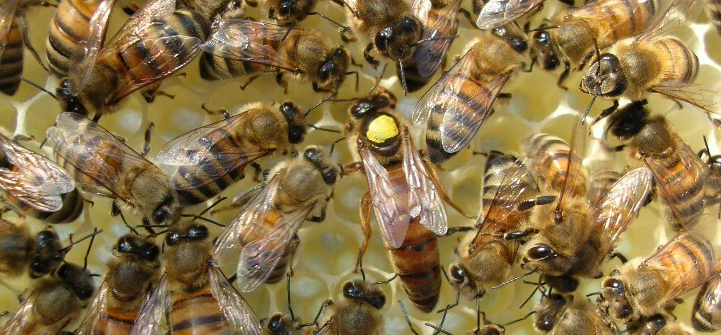Research Updates from the Managed Pollinator CAP: Coordinated Agricultural Project
Table of Contents:
- Recollection of European Apis Mellifera Germplasm for Honey Bee Breeding, by Walter Sheppard, Washington State University: February 2013
- Varroa Mite Reproductive Biology, by Zachary Huang, Michigan State University: October 2012
- Neonicotinoid Seed Treatments and Honey Bee Health, by Greg Hunt and Christian Krupke, Purdue University: September 2012
- Lessons Learned by the Managed Pollinator CAP: Impacts of Varroa Parasitism on Honey Bee Health, by Katherine Aronstein and Angela Douglas: August 2012
- Sunlight, Water, and Nosema Spores, by Thomas C. Webster, Kentucky State University: May 2012
- The First Two Years of the Stationary Hive Project: Abiotic Site Effects, by F. Drummond, K. Aronstein, J. Chen, J. Ellis, J. Evans, N. Ostiguy, W. Sheppard, M. Spivak, and K. Visscher: April 2012
- Honey Bee Genetic Diversity and Breeding: Towards the Reintroduction of European Germplasm, by Walter S. Sheppard, Washington State University: February 2012
- The Managed Pollinator CAP after Three Years: Highlights and Emerging Trends, by Keith S. Delaplane, Professor and CAP Director, University of Georgia: January 2012
- Nest Location in Bumble Bees: Effect of Landscapes and Insecticides by Anne L. Averill, University of Massachusetts/Amherst: December 2011
- An Update on Bee Breeding Efforts in Indiana: Breeding for Resistance to Israeli Acute Paralysis Virus, by Greg Hunt, Dave Shenefield, Krispn Given, and Jennifer Tsuruda: November 2011
- Miticide and Fungicide Interactions. Reed M. Johnson: October 2011
- Effects of Nosema on Honey Bee Behavior and Physiology, Zachary Huang: September 2011
- Pesticides and Their Involvement in Colony Collapse Disorder Jim Frazier, Chirs Mullin, Maryann Frazier, and Sara Ashcraft: August 2011
- Assessing the Risks of Honey Bee Exposure to Pesticides Marion Ellis and Bethany Teeters: July 2011
- Laying Groundwork for a Sustainable Market of Genetically-Improved Queens: The Bee Team Marla Spivak, University of Minnesota: May 2011
- Genetic Toolkits for Bee Health Jay D. Evans, USDA-ARS Bee Research Laboratory, Beltsville, MD April 2011
- Best Management Practices (BMPs) For Beekeepers Pollinating California’s Agricultural Crops Christi Heintz, Meg Ribotto, Marion Ellis, Keith S. Delaplane: March 2011
- Microsporidia: Friend, Foe (and Intriguing Creatures) Leellen F. Solter University of Illinois, Urbana-Champaign: December 2010
- Wild Bee Status and Evidence for Pathogen Spillover with Honey Bees Anna Morkeski and Anne Averill, University of Massachusetts/Amherst November 2011
- Honey Bee Nutrition Zachary Huang, Michigan State University: August 2010
- Breeding Bees for Resistance to Parasites and Diseases Greg J. Hunt, Purdue University: July 2010
- The Stationary Apiary Coordinated Agricultural Project: A View from the Front Lines, Kerry Lynott, Pennsylvania State University: June 2010
- Pesticides Applied to Crops and Honey Bee Toxicity, Marion Ellis, University of Nebraska, Lincoln: May 2010
- Nosema ceranae – The Inside Story, Tom Webster, Kentucky State University: Apr 2010
- Honey Bee Medical Records: The Stationary Apiary Monitoring Project, Marla Spivak, University of Minnesota: Mar. 2010
- Sustainable Beekeeping, Nancy Ostiguy, Penn State University: Feb 2010
- Detect Nosema Parasite in Time to Save Bee Colonies, Katherine Aronstein, Research Molecular Biologist, USDA/ARS, Honey Bee Research Unit, Weslaco, Texas: Jan 2010
- When Varroacides Interact, Reed Johnson, University of Nebraska – Lincoln: Dec. 2009
- Managed Pollinator CAP: Introduction, Keith S. Delaplane, University of Georgia: Nov. 2009
Managed Pollinator CAP Web-Page: www.beeccdcap.uga.edu
Awareness of the decline of honey bees and other pollinators took a dramatic upturn after two recent events: the October 2006 release of the National Research Council report “Status of Pollinators in North America” followed by high death rates of bee colonies in the winters of 2006-2008, a phenomenon now called Colony Collapse Disorder (CCD). All at once, managed pollinators were popularly recognized for what they always were: essential members of American agro-ecosystems.
The problems with managed pollinators cannot be relegated to one or few causative agents. Bee declines are likely a product of negatively interacting factors in pathology, immunology, nutrition, toxicology, genetics, ecosystems management, and bee husbandry. In response, we have assembled a nationally-coordinated team of experts with proven capacity in extension, genomics, pathology, toxicology, management, pollination, and bee behavior. Our long-term goal is to restore large and diverse populations of managed bee pollinators across the United States to sustain natural and agricultural plant communities.
Dr. Keith S. Delaplane
University of Georgia
Department of Entomology
More information about the Managed Pollinator CAP can be found at their web-page at www.beeccdcap.uga.edu

